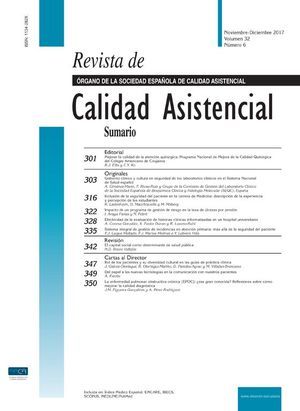The Journal of Healthcare Quality Research (JHQR) begins 2025 with a renewed vision, commitment, symbolized by a new cover that represents more than a visual update—it reflects a profound transformation in the journal's essence and operations. This evolution is rooted in the publication's history, from its origins as Control de Calidad, through its years as Revista de Calidad Asistencial, and now as JHQR. Each phase has marked a milestone in the journal's four decades of contributions to healthcare quality improvement, reflecting its ability to adapt to the unique challenges of each era.
From Control de Calidad to Revista de Calidad Asistencial: laying the foundationsThe journal's origins in 1985 as Control de Calidad, under the auspices of the Spanish Society for Healthcare Quality (Sociedad Española de Calidad Asistencial, SECA), reflect an era where quality management in healthcare was gaining recognition as a cornerstone of health system performance, emerging from quality assurance. In its early years, the journal provided a platform for sharing emerging methodologies and best practices in the field. As its scope broadened, the journal was renamed Revista de Calidad Asistencial(RCA) to reflect a more comprehensive focus on healthcare quality.1,2
Over time, RCA gained recognition for its pioneering efforts, such as the introduction of digital formats and innovative editorial systems. The move to digital-only publication in 2013 exemplifies its continuous innovation in response to technological advancements. These steps significantly reduced editorial timelines, with articles becoming citable earlier via DOI and available online in multiple formats.2
Achieving global recognition: Medline indexation and beyondThe inclusion of RCA in Medline in 2009 was a defining moment in the journal's history. This milestone marked the international recognition of RCA's scientific maturity, enabling broader dissemination and credibility for its published work.1 This achievement paved the way for further ambitions, including obtaining an official impact factor—a process that required inclusion in the Science Citation Index (SCI).
Medline was described as a starting point rather than an endpoint.1 Efforts to position the journal for greater international impact continued with strategies to increase citation rates and attract high-quality manuscripts. These measures were part of a broader vision to ensure the journal's relevance and usefulness in advancing healthcare quality worldwide.1–3
The Leap to Internationalization: Rebranding as JHQRIn 2018, the journal underwent another transformative phase with its rebranding to Journal of Healthcare Quality Research(JHQR). This decision reflected the growing dominance of English as the global language of science. It was part of a strategy to reach a wider audience through a multilingual approach. The journal's interdisciplinary focus further strengthened its ability to serve a global community of researchers, practitioners, and policymakers. Modern tools and practices were also integrated, such as active participation in social media and digital platforms. These innovations enhanced accessibility and engagement. The editorial team emphasized that such advancements were not merely operational improvements but key to the journal's mission to disseminate actionable knowledge and foster innovation.3
Impact factorAchieving an impact factor in 2023 marked another milestone in the journal's trajectory. This achievement was the result of decades of consistent effort to improve the journal's visibility, quality, and relevance. Being recognized with an impact factor highlights the scientific community's trust in the rigorous research published in JHQR. It also reflects the journal's increasing reach and influence, encouraging further contributions of high-quality work from researchers worldwide.4
Era of agility and excellenceAs JHQR enters 2025, it is poised to introduce a more agile editorial process aimed at significantly reducing the time between manuscript submission and publication. This change marks a shift away from traditional batch publishing—authors will no longer need to wait for issue closure before their work becomes available. The new model ensures that high-quality research reaches readers promptly, maximizing its relevance and impact.
The journal's interdisciplinary approach will remain central to its mission, fostering dialogue across disciplines to address complex healthcare challenges. By prioritizing diversity in authorship and topics, JHQR will continue to provide a platform for innovative solutions that resonate globally.
Gratitude and reflectionThe journey of JHQR has been shaped by the dedication and vision of its editorial teams, reviewers, and contributors. From the artisanal beginnings of Control de Calidad to the global impact of JHQR, the journal's trajectory is a testament to the collective efforts of the SECA community. Each milestone—whether Medline indexation, the transition to a digital format, or obtaining an impact factor—reflects the unwavering commitment to excellence.
We extend our deepest gratitude to our authors, reviewers, and readers, as well as to all the members of the Sociedad Española de Calidad Asistencial, whose trust in the editorial committee and unwavering support have been instrumental in shaping the journal's legacy and future.
Looking aheadThe changes introduced in 2025 are part of a continuous improvement process. Innovation and adaptability are crucial for maintaining relevance in a rapidly evolving scientific landscape. The new cover represents not only a fresh design but also a renewed commitment to advancing healthcare quality research.
We invite you to join us in this new chapter for JHQR. Together, we can ensure that every article published contributes meaningfully to improving healthcare systems and patient outcomes worldwide. Every experience, no matter how small, has the potential to add value.
Let us move forward with confidence and determination, embracing each step as part of a journey toward continuous improvement. Excellence may not exist as a final destination, but our commitment to evolving and striving for better outcomes will guide us forward.







